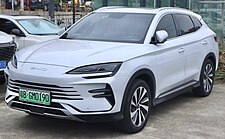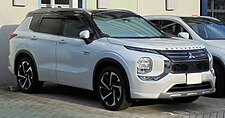This article needs to be updated. (December 2023) |
| Part of a series on |
| Sustainable energy |
|---|
 |
A plug-in hybrid electric vehicle (PHEV) or simply plug-in hybrid is a type of hybrid electric vehicle equipped with a rechargeable battery pack that can be directly replenished via a charging cable plugged into an external electric power source, in addition to charging internally by its on-board internal combustion engine-powered generator. While PHEVs are predominantly passenger cars, there are also plug-in hybrid variants of sports cars, commercial vehicles, vans, utility trucks, buses, trains, motorcycles, mopeds, military vehicles and boats.[7]
Similar to battery electric vehicles (BEVs), plug-in hybrids can use centralized generators of renewable energy (e.g. solar, wind or hydroelectric) to be largely emission-free, or a fossil plant in which case they displace greenhouse gas emissions from the car tailpipe exhaust to the power station. As opposed to conventional hybrid electric vehicles (HEVs), PHEVs generally have a larger battery pack that can be recharged (theoretically) from anywhere with access to the electrical grid, offering enhanced energy efficiency and cost-effectiveness when compared to relying solely on the on-board generator. Additionally, PHEVs can support longer and more frequent all-electric range driving, and their electric motors often have higher power output and torque, are more responsive in acceleration, and overall have lower operating costs. Although a PHEV's battery pack is smaller than that of all-electric vehicles of the same weight, as it must accommodate its combustion engine and hybrid drivetrain, it provides the added flexibility of reverting to the use of its gasoline/diesel engine, akin to a conventional HEV if the battery charge is depleted. This feature helps alleviate range anxiety, particularly in areas lacking sufficient charging infrastructure.
Mass-produced PHEVs have been available to the public in China and the United States since 2010,[8][9][10] with the introduction of the Chevrolet Volt, which was the best selling PHEV until it was surpassed by the Mitsubishi Outlander PHEV at the Volt's end of production in 2019.[11] By 2021, BYD Auto emerged as the largest plug-in hybrid vehicle manufacturer in the world. As of May 2024[update], BYD plug-in hybrid cumulative sales surpassed 3.6 million units.[12] The BYD Song DM line of SUVs contributed over 1.05 million units.[13][14][2][15]
As of December 2019[update], the global stock of PHEVs totalled 2.4 million units, representing one-third of the stock of plug-in electric passenger cars on the world's roads.[16] As of December 2019[update], China had the world's largest stock of PHEVs with 767,900 units, followed by the United States with 567,740, and the United Kingdom with 159,910.[16]
- ^ "BYD Song Pro DM - Sales in China". www.chinamobil.ru. Retrieved 2023-12-14.
- ^ a b "2021年全球新能源乘用车销量榜:冠亚军分别是特斯拉、比亚迪、上汽通用五菱-华夏EV网". www.evinchina.com. Retrieved 2024-04-30.
- ^ "【易车销量榜】全国2023年插电混动批发量销量榜-易车榜-易车". car.yiche.com. Retrieved 2024-01-21.
- ^ Cite error: The named reference
MOPHEV200kwas invoked but never defined (see the help page). - ^ Cite error: The named reference
MOPHEV290kwas invoked but never defined (see the help page). - ^ Cite error: The named reference
Top5Global102018was invoked but never defined (see the help page). - ^ "Hybrid boats to revolutionise sustainable river travel". www.thamesclippers.com. Retrieved 2023-09-29.
- ^ Cite error: The named reference
GCC0310was invoked but never defined (see the help page). - ^ Cite error: The named reference
Edmunds310was invoked but never defined (see the help page). - ^ Cite error: The named reference
Volt1stDeliverywas invoked but never defined (see the help page). - ^ "Mitsubishi Outlander PHEV Hits 200,000 Global Sales Milestone" (Press release). Tokyo: Mitsubishi Motors Corporation (MMC). 2019-04-11. Retrieved 2020-05-16.
- ^ 孙迟. "BYD releases 5th-generation DM hybrid technology with 2,100-km range". www.chinadaily.com.cn. Retrieved 2024-07-27.
- ^ "【易车销量榜】全国2023年比亚迪插电混动零售量销量榜-易车榜-易车". car.yiche.com. Retrieved 2024-02-25.
- ^ "【易车销量榜】全国2022年比亚迪插电混动零售量销量榜-易车榜-易车". car.yiche.com. Retrieved 2024-02-25.
- ^ "【易车销量榜】全国2020年比亚迪插电混动零售量销量榜-易车榜-易车". car.yiche.com. Retrieved 2024-03-01.
- ^ a b International Energy Agency (IEA) (June 2020). "Global EV Outlook 2020: Entering the decade of electric drive?". IEA Publications. Archived from the original on 2021-09-10. Retrieved 2020-06-15. See Statistical annex, pp. 247–252 (See Tables A.1 and A.12). The global stock of plug-in electric passenger vehicles totaled 7.2 million cars at the end of 2019, of which, 47% were on the road in China. The stock of plug-in cars consist of 4.8 million battery electric cars (66.6%) and 2.4 million plug-in hybrids (33.3%). In addition, the stock of light commercial plug-in electric vehicles in use totaled 378 thousand units in 2019, and about half a million electric buses were in circulation, most of which are in China.


